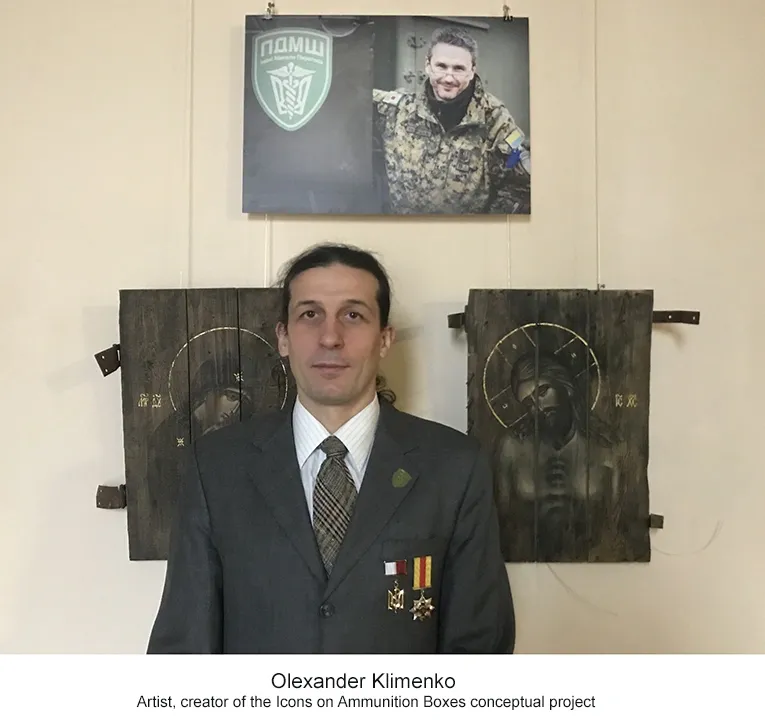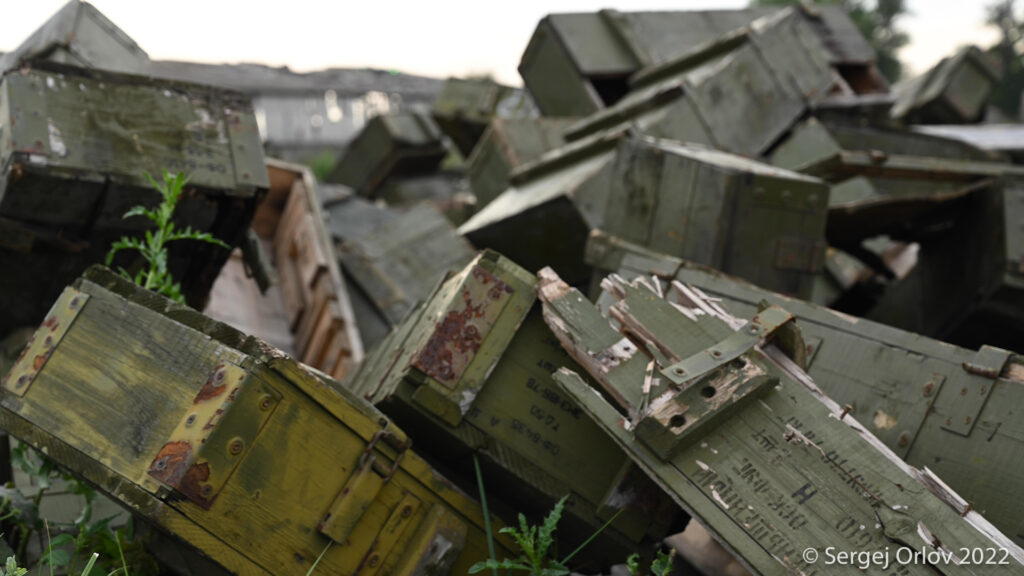ARTISTS STATEMENT:
Transforming death into life. Transformation of war into peace. This is what everyone who faced the horrors of war dreams of. Icons on Ammunition Boxes project, which we started in the autumn of 2014 was our common dream of peace in Ukraine. An icon can wonderfully tell not only about the events of two thousand years ago, but also about the tragic vicissitudes of modern warfare, the war unfolding before our eyes, the war in which hundreds of thousands are directly involved and millions are displaced.
It turned out that icons’ classical context could be altered by painting them not on the usual icon-painting board, but on fragments from ammunition boxes brought from the Front. And an icon, while remaining an icon, expands its semantic and symbolic symbols, a testament not only to the Incarnation, but also to the tragedy of modern war.
The board on which a traditional icon is painted is incredibly similar to the lid or bottom of an ammunition box – the same shield, made of boards and reinforced to avoid deformation, with spoons. This strange resemblance prompted us to paint the first icon of the project. While visiting the base of one of the volunteer battalions in the fall of 2014, we noticed this phenomenon. When we saw a pile of empty ammunition boxes, we asked the military what they were doing with them. Most of them were burned, and some were made into donkeys and shelves. Having received as a gift from the soldiers one of the boxes, dark, slightly smoky, the next day we used its bottom to paint an icon of the Mother of God, focusing on the classic Old Byzantine model. What carried death, in the process of creative act began to carry what in the Ukrainian tradition is associated with life, symbolizing it, like nothing else – an icon.
Ammunition boxes are visually similar to coffins. Moreover, these boxes are usually like coffins, hidden deep underground in military warehouses and arsenals. The war begins and, like in a Hollywood horror movie, coffin boxes appear in the world of God, death escapes from them, destroying everything in its path. However, the last point in this process is set by the artist, and the shells of death, “its place of residence” strangely begin to radiate life.
Work on the first series of icons began in mid-autumn of 2014 and lasted until the end of the winter of 2015 during the fierce battles for the Donetsk airport (DAP), in the tragic days of Debaltseve’s defense. In fact, a significant number of boxes for the first icons were brought from the village of Pisky, near DAP. We were pleasantly surprised and quite impressed by the reaction of the military and volunteers to our project, their enthusiasm, their willingness to help and to bring ammunition boxes from the Front because even during fierce battles, under bullets, shells and mines they did not forget about our request. Sometimes, picking up a pile of boxes, someone would call from the Front to apologize for not bringing the boxes we needed as they were all destroyed during the artillery shelling. That is why those who brought ammunition boxes from the Front, in our opinion, can be considered full participants in the project, a kind of co-authors. Finding, saving and bringing a box from the Front is incredibly important for the project; it is, in our opinion, the same creative act as painting the icon itself. Of course, the project would not have taken place without the military and volunteers. This co-authorship seems to have been extremely valuable to all those who, for all these years, often risked their own lives to collect and carry boxes from the Front.
One of the central metaphors of our project is that ammunition boxes after the battle get a new life, acquire in a new function, become icons. In the same way as veterans must receive the public love, respect and care they undoubtedly fully deserve.
Another important part of the project is volunteerism. Volunteering became an example of self-organization of Ukrainians, a kind of test of humanity, a clear manifestation of grassroots democracy. Volunteering is also a sign of the maturity of civil society, the readiness of this society to solve complex issues, to overcome the challenges posed by modernity. At the same time, volunteering fits perfectly into the Christian concept of self-sacrifice and helping others. Perhaps volunteering is what the modern Ukrainian is most successful at, something Ukrainians can be proud of, a unique experience that we can and are ready to share with the world.
It seemed unethical to us to keep funds from sale of icons for ourselves during the war, as if profiting from death and war. That’s why we decided to turn our art project into a volunteer initiative. We approached one of the founders of the Pirogov First Mobile Hospital. Gennady Druzenko, with a proposal for cooperation, and since then we mainly help this hospital – the largest non-governmental medical project in the environmental protection zone. Our art initiative became one of the hospital’s main financial donors, providing more than 90 percent of its needs.
Thus, if the first stage of the project was an attempt to speak about modern war in the language of traditional art, then gradually the emphasis shifted and included discussions of the role of volunteering in the context of this war. The art project went beyond its own limits. The symbolic victory of life over death – its core idea – has become a reality.




